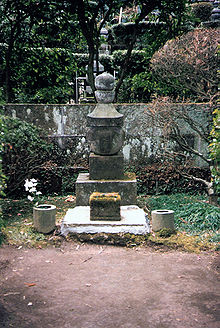- Kitaro Nishida
-
西田 幾多郎 Nishida Kitarō 
Full name 西田 幾多郎 Nishida Kitarō Era 20th century philosophy Region Japanese philosophy School Kyoto School Main interests Zen Buddhism, Moral philosophy Notable ideas Logic of Basho (non-dualistic concrete logic), Absolute Nothingness Influenced by- Henri Bergson, William James, Immanuel Kant, G.W.F. Hegel, Josiah Royce, Edmund Husserl, Søren Kierkegaard
Influenced- Hajime Tanabe, Nishitani Keiji, Shin'ichi Hisamatsu, Watsuji Tetsuro, Kuki Shūzō, Shimizu Hiroshi, Morita Shiryu, Kimura Bin, Nakamura Yujiro...
Kitaro Nishida (西田 幾多郎 Nishida Kitarō, June 17, 1870 – June 7, 1945) was a prominent Japanese philosopher, founder of what has been called the Kyoto School of philosophy. He graduated from The University of Tokyo during the Meiji period in 1894 with a degree in philosophy. He was named professor of the Fourth High School in Ishikawa Prefecture in 1899 and later became professor of philosophy at Kyoto University. Nishida retired in 1927. Later in his retirement, in 1940, he was awarded the Order of Culture (文化勲章, bunka kunshō). He participated in establishing the (千葉工業大学, Chiba Institute of Technology) from 1940. Nishida Kitaro died at the age of seventy-five of a renal infection. His grave is located at Reiun'in (霊雲院, Reiun'in), a temple in the Myōshin-ji compound in Kyoto.
Contents
Philosophy
Having been born in the third year of the Meiji period, Nishida was presented with a newly unique opportunity to contemplate Eastern philosophical issues in the fresh light that Western philosophy shone on them. Nishida's original and creative philosophy, incorporating ideas of both Zen and western philosophy, was aimed at bringing the East and West closer. Throughout his lifetime, Nishida published a number of books and essays including "An Inquiry into the Good" and "The Logic of the Place of Nothingness and the Religious Worldview." Taken as a whole, Nishida’s life work was the foundation for the Kyoto School of Philosophy and the inspiration for the original thinking of his disciples. The most famous concept in Nishida's philosophy is the logic of basho (Japanese: 場所; usually translated as "place" or "topos"), a non-dualistic concrete logic, meant to overcome the inadequacy of the subject-object distinction essential to the subject logic of Aristotle and the predicate logic of Kant, through the affirmation of what he calls the "absolutely contradictory self-identity", a dynamic tension of opposites that, unlike the dialectical logic of Hegel, does not resolve in a synthesis, but rather defines its proper subject by maintaining the tension between affirmation and negation as opposite poles or perspectives.
Legacy
According to Masao Abe, "During World War II right wing thinkers attacked him as antinationalistic for his appreciation of Western philosophy and logic. But after the war left wing thinkers criticized his philosophy as nationalistic because of his emphasis on the traditional notion of nothingness. He recognized a kind of universality in Western philosophy and logic but did not accept that it was the only universality."[1]
Nishida´s essays during the military regime are described by Christopher Ives (Stonehill College) as serving: 'a philosophical basis for the state and the war.' (See Ishikawa Hakugen.)
Preceded by
unknownDepartment of Philosophy (Chair), Kyoto University
1913-1928Succeeded by
Hajime TanabeSee also
- Soku hi
- Meontology
- Nothingness
- Philosopher's Walk
References
Partial bibliography
- An Inquiry Into the Good (ISBN 0-300-05233-2), Nishida Kitaro, Translated by Masao Abe and Christopher Ives
- Last Writings (ISBN 0-8248-1554-8), Nishida Kitaro, Translated by David Dilworth
- Imperial-Way Zen: Ishikawa Hakugen's Critique and Lingering Questions for Buddhist Ethics. Christopher Ives University of Hawaii
Secondary resources
- Zen & Philosophy: An Intellectual Biography of Nishida Kitaro (ISBN 0-8248-2459-8), Michiko Yusa
- Philosophers of Nothingness (ISBN 0-8248-2481-4), James Heisig
- Nishida Kitaro (ISBN 0-520-07364-9), Nishitani Keiji
- The Logic Of Nothingness: A Study Of Nishida Kitaro (ISBN 0-8248-2969-7), Robert J. J. Wargo
- The Nothingness beyond God: An Introduction to the Philosophy of Nishida Kitaro (ISBN 1-55778-761-1), Robert E. Carter
External links
- Nishida Kitaro at the Stanford Encyclopedia of Philosophy
- Derrida and the Decentered Universe This article mentions Nishida's views in comparison with Derrida's.
Categories:- 1870 births
- 1945 deaths
- Japanese Buddhists
- Buddhist philosophers
- Japanese philosophers
- 20th-century philosophers
- Japanese writers
- Buddhist writers
- Recipients of the Order of Culture
- University of Tokyo alumni
- Kyoto University faculty
- Nihon University faculty
- Keio University faculty
- Taisho University faculty
Wikimedia Foundation. 2010.

